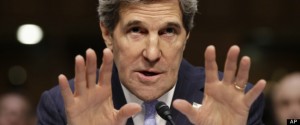 John Kerry made his first trip to an Arab capital as secretary of state on Saturday, hoping to prod Egyptian politicians to commit themselves to a series of economic reforms.
John Kerry made his first trip to an Arab capital as secretary of state on Saturday, hoping to prod Egyptian politicians to commit themselves to a series of economic reforms.
A main goal of Mr. Kerry’s trip is to encourage a measure of political peace and a commitment to economic change needed to secure a crucial $4.8 billion loan from the International Monetary Fund. The United States and the European Union are prepared to provide hundreds of millions of dollars in additional assistance if Egypt can reach agreement with the I.M.F.
Speaking to a group of Egyptian business leaders after landing in Cairo, he called the economic reforms “paramount, essential, urgent.”
Egypt’s economy has teetered near collapse for months, with soaring unemployment, a gaping budget deficit, dwindling hard-currency reserves and steep declines in the currency’s value.
The two years of tumult that began with the ouster of former President Hosni Mubarak also sharply slowed foreign investment and tourism, and economists say the Egyptian government urgently needs a cash infusion of several billion dollars to fend off the risk of an economic calamity that could lead to more unrest and instability.
The I.M.F. has held off-again-on-again negotiations with Egypt for more than a year over providing the $4.8 billion. The fund’s loan is critical, economists say, because it would provide a seal of approval that Egypt’s economy is on a path toward self-sufficiency, allowing Cairo to obtain enough other international loans to fill in its deficit.
Economists familiar with the loan talks say that the fund’s American and European backers are eager to complete the loan to move Egypt toward stability, but that the fund has imposed two difficult conditions.
It has required the Egyptian government to commit itself to undertaking painful reforms like raising taxes and reducing energy subsidies. It has also required a demonstration of political support for the reforms and the loan, to ensure that the government will honor its commitments in the future. That requires a dependable political process, as well a degree of consensus that Egypt’s political factions have been unable to sustain.
There needs to be “a basic political agreement among all of the various players in Egypt,” said a senior State Department official who traveled with Mr. Kerry.
Toward that end, Mr. Kerry plans to conduct an intensive series of meetings with members of the political opposition, the business community and ranking government officials.
Parliamentary elections are scheduled for April in Egypt. The major opposition group, the National Salvation Front, has announced that it plans to boycott the vote to protest what it says is a push by President Mohamed Morsi and his Islamist allies to dominate politics.
The senior American official said that Mr. Kerry would not insist that the opposition participate in the election, but that he planned to make the argument that Mr. Morsi’s rivals need to participate in the political process if they want their views to be taken into account.
Mr. Kerry met with Amr Moussa, a former foreign minister under Mr. Mubarak and one of the leaders of the National Salvation Front, and spoke by phone with another leader of the group, Mohamed ElBaradei.
On Sunday, Mr. Kerry is scheduled to meet with Mr. Morsi.
The protests and street violence that have destabilized Egypt’s transition continued Saturday even as Mr. Kerry arrived for his visit. The Egyptian state news media reported that a demonstrator in the Nile Delta city of Mansoura was killed when he was run over by an armored police vehicle.
Clashes between the police and protesters had broken out in the city several days ago and picked up on Saturday after the killing. Dozens were injured, the state news media said.
Violence also flared up again in the Suez Canal city of Port Said, where the state news media reported that protesters had burned down a police station. The Port Said protests began on Jan. 26 after 21 local soccer fans were sentenced to death for their role in a deadly riot at a match last year. Two police officers and more than 40 protesters were killed in the ensuing riots.
Residents have demanded a new trial for the soccer fans and retribution for those killed by the police.
Over the past month, however, the demonstrations in Port Said have blurred together with sometimes-violent protests in several other cities along the Suez Canal or in the Nile Delta. Some protesters are angry at Mr. Morsi and the Muslim Brotherhood, accusing them of failing to deliver fast enough on the anticipated rewards of the revolution, including economic benefits.
NY Times

Leave a Reply